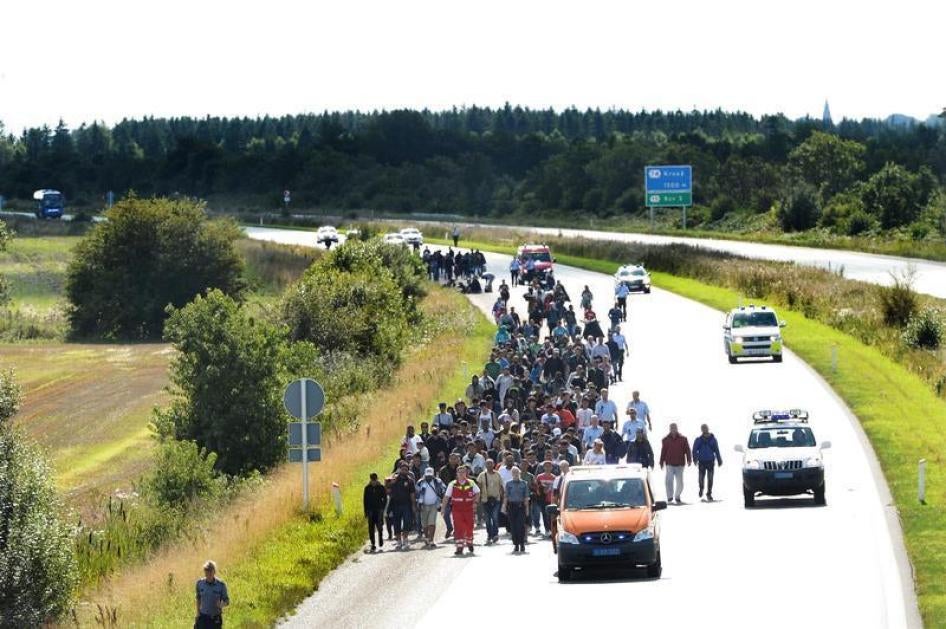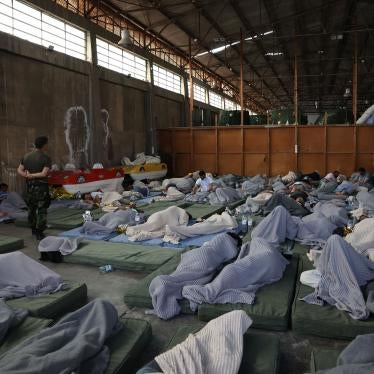GEVGELIJA, Macedonia — With new arrivals at 340,000 and counting, Germany expecting 800,000 asylum applications by year’s end, and an EU backlog of 575,000 asylum cases awaiting a first interview, European Union interior ministers meeting in emergency session on September 14 should take a fresh look at how they process large numbers of asylum claims.
One option is to keep current procedures but boost resources to meet increased demand. To its credit, Germany will add another 700 civil servants to deal with the high number of pending asylum claims. While laudable, German Chancellor Angela Merkel has said that approach is not sustainable.
When other countries, particularly in Africa, are faced with mass influxes, they recognize asylum seekers as refugees on a prima facie basis rather than through an individualized process. This works in situations, such as ethnic cleansing, where large numbers of people fitting the same profile flee at the same time for essentially the same reasons.
Many EU countries already grant subsidiary protection as a matter of course to Syrians who seek asylum — as protection rates above 90 percent make clear — with a subset of Syrian asylum seekers subsequently receiving full refugee status. It is simply a matter of formalizing that approach across the EU as a whole.
Clear the Backlog
The ministers could advise member states to grant refugee status or subsidiary protection to Syrians or other nationalities or sub-groups on a prima facie basis, as would be allowed by the “more favorable provisions” of the EU directive on asylum procedures.
Another option would be to offer such groups temporary protection, the approach taken by Syria’s neighbors, Lebanon, Turkey, and Jordan. They don’t grant refugee status at all, but rather provide blanket protection to Syrians on a temporary basis.
In 2001, when Europe was not faced with masses of asylum seekers on its borders, the European Commission issued a Temporary Protection Directive to be activated in the event of a mass influx. It established common standards and operating principles predicated on the idea that time and resources shouldn’t be wasted on processing individual asylum claims during refugee emergencies, but should be devoted to providing quick and efficient protection to everyone fleeing that crisis.
Unlike the temporary protection regimes operating now in the Middle East, the EU model would provide clear rights and benefits and would not preclude refugee status and eventual integration. That directive has never been activated and is under review in Brussels. But how it’s triggered or labeled is less important than making it happen.
Agreeing to grant all Syrians or other groups with clearly meritorious claims some form of basic protection and legal status would also serve government interests. It could free up the system to focus on people with weak claims for protection or other grounds to remain and hasten their removal. It could also reduce asylum backlogs, so instead of keeping asylum seekers dependent on social services for many months, beneficiaries would be authorized to work, becoming self-sufficient and contributing to the economy.
The EU’s problem is also about how asylum seekers are distributed.
Its response is crippled by the Dublin Regulation, the rule that the first EU country reached by an asylum seeker is responsible for processing their claim. The rule is patently unfair to countries on the EU’s outer borders, and Dublin needs to be overhauled or scrapped.
My suggestion: the rule for assigning responsibility for examining asylum claims ought to be based on the country of first application, rather than the country of first arrival. Dublin currently allows this as an exception for unaccompanied children. The exception should be the rule. But this would only work if accompanied by a system for sharing responsibility among EU member states, so that the most popular destinations did not bear a disproportionate burden.
Common System
Whatever rule is applied, no country should be overwhelmed while others have the capacity to help. So far, EU member states have shown little willingness to help each other. When EU ministers met in July to pledge how many asylum seekers they would take to meet a previously agreed goal to relocate 40,000 asylum seekers from Greece and Italy, they fell well short. The United Kingdom was not willing to take a single person. The European Commission is expected to propose a significant increase in relocations from Greece, Italy and Hungary. It is vital that the U.K. and other hold-out EU governments respond positively.
Mostly, cooperation has come in the form of coordinating border enforcement and other control measures. At the same meeting where ministers failed to offer sufficient help to Greece and Italy, they agreed to harmonize their national “safe country of origin” lists, and to name the countries of the Western Balkans as safe, meaning that asylum seekers from those countries now have to overcome a presumption that they are not refugees.
But those same ministers have not even considered agreeing to call Syria unsafe and establishing a presumption that they should be accepted.
The EU faces a real problem — but it’s manageable; its solution depends as much on political will as on resources or managerial ingenuity. To make any coordinated system work, each member state needs to meet the common set of standards. If the EU truly had a common system and asylum seekers could expect the same treatment and same consideration of their refugee claims whether in Bulgaria or Sweden, the incentive to move onward would be lessened considerably.
Achieving that will require bringing the asylum and reception systems of all EU states into line not only with EU law but with the principle of solidarity with each other and, let us hope, with the people seeking their help and protection.
Until all member states are willing to provide decent reception conditions and fair hearings of asylum claims, however, they should at least agree on an equitable burden-sharing arrangement that doesn’t punish a state like Germany for treating asylum seekers relatively decently — or a state like Greece for its geographical location.










